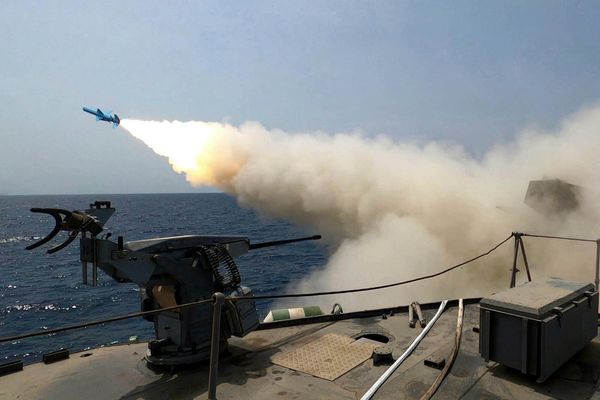Caterpillar, a bellwether for the global economy, posted bigger-than-expected declines in first-quarter earnings and revenue early Wednesday. The Dow Jones construction and mining equipment giant traded higher in early stock market action, before a market downdraft erased the gains.
The company said it stands to face a $250 million to $350 million cost headwind from tariffs in Q2, before actions to mitigate the impact. But Caterpillar stuck by its January outlook for a slight sales decline in 2025, assuming current tariff levels hold.
Caterpillar gets nearly half of its revenue from outside the U.S., with China accounting for almost 10%, Brazil nearly 6%, according to FactSet. That makes it a tariff-sensitive indicator in the midst of the current trade war.
Caterpillar Earnings
Estimates: For the quarter, analysts expected Q1 EPS to slump 22% to $4.35 a share. Revenue was seen falling 7% to $14.7 billion.
Results: Caterpillar earnings per share slid 24% to $4.25. Revenue fell 10% to $14.2 billion.
Caterpillar said that sales fell due to $1.1 billion in lower volume and $250 million in lower pricing. Lower demand mainly reflected changes in dealer inventories.
Outlook: Caterpillar offered two scenarios. With no impact from tariffs, it said full-year sales should be about flat vs. 2024, which was better than January's outlook for a slight decline. However, if tariffs stay at April 29 levels, sales should still match January's guidance.
Following Caterpillar's introduction of its 2025 outlook in January, analysts had cut their sales forecast to $62.5 billion, down 3.5% on the year, according to FactSet.
Caterpillar Exposure To Trump Tariffs
Caterpillar's outgoing CEO Jim Umpleby struck a cautiously optimistic tone on the Jan. 30 first-quarter earnings call. "The fact that we have such a large U.S. manufacturing presence, I think, positions us pretty well."
Asked about contingency plans for managing tariffs on products imported from China, Umpleby noted that Caterpillar is a "net exporter." The company tends to produce in the same region its products are sold, he said.
The Irving, Texas company's latest 10-K warns that international trade policies, including tariffs, "may impact demand for our products and our competitive position."
"For example, a government's adoption of "buy national" policies or retaliation by another government against such policies could have a negative impact on our results."
Uncertainty Risk From Trump Tariffs
United Rentals, an indirect competitor to Caterpillar, as well as a customer, topped Q1 earnings estimates on April 24 and touted healthy demand across its industrial and construction markets, particularly for large projects. "We've not seen a change in customer outlooks for the balance of 2025," CEO Matthew Flannery said.
However, United Rentals CFO Ted Grace added that uncertainty over tariffs and the economic outlook play to his firm's strengths. "Any time there's uncertainty, that tends to favor rental over ownership," he said.
CAT Stock
CAT stock shook off the Q1 miss, rising as much as 2% in volatile early trade. But CAT slipped 1% after the open as the S&P 500 sold off.
Through Tuesday, the Dow Jones stock has fallen 26.5% from its 52-week high, which came the day after the 2024 Election Day, though CAT stock has a three-week winning streak, including a 4.15% advance last week.
However, shares remain stuck below their 50-day moving average and 200-day moving average. Further, the stock's relative strength line, the blue line in IBD charts that tracks a stock's progress vs. the S&P 500, is close to a two-year low.
Be sure to read IBD's The Big Picture column after each trading day to get the latest on the prevailing stock market trend and what it means for your trading decisions.







